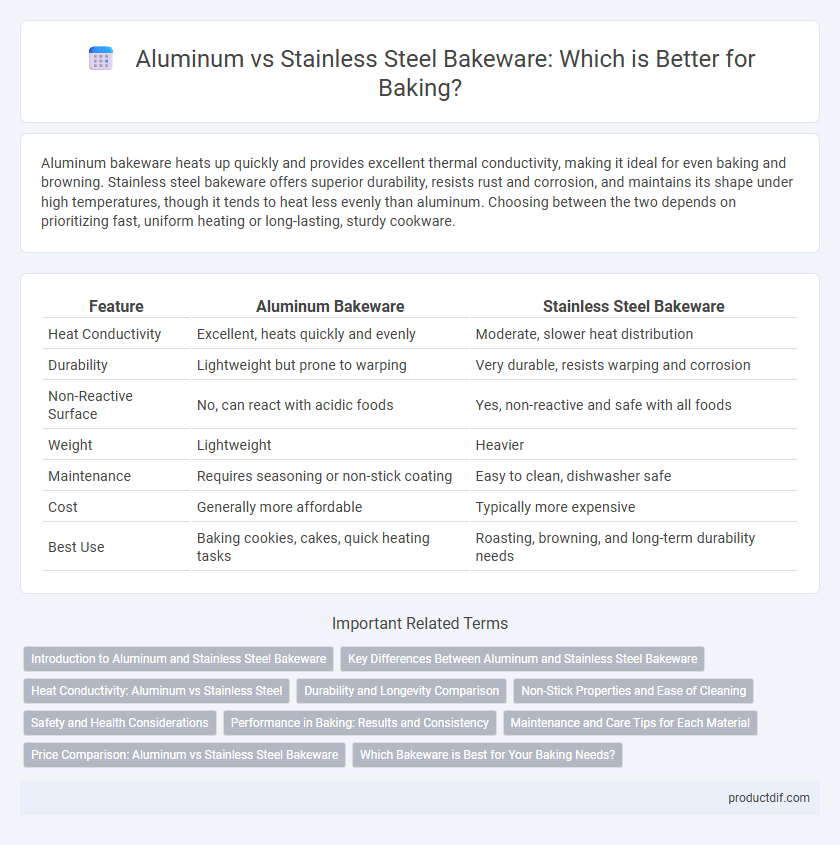Aluminum bakeware heats up quickly and provides excellent thermal conductivity, making it ideal for even baking and browning. Stainless steel bakeware offers superior durability, resists rust and corrosion, and maintains its shape under high temperatures, though it tends to heat less evenly than aluminum. Choosing between the two depends on prioritizing fast, uniform heating or long-lasting, sturdy cookware.
Table of Comparison
| Feature | Aluminum Bakeware | Stainless Steel Bakeware |
|---|---|---|
| Heat Conductivity | Excellent, heats quickly and evenly | Moderate, slower heat distribution |
| Durability | Lightweight but prone to warping | Very durable, resists warping and corrosion |
| Non-Reactive Surface | No, can react with acidic foods | Yes, non-reactive and safe with all foods |
| Weight | Lightweight | Heavier |
| Maintenance | Requires seasoning or non-stick coating | Easy to clean, dishwasher safe |
| Cost | Generally more affordable | Typically more expensive |
| Best Use | Baking cookies, cakes, quick heating tasks | Roasting, browning, and long-term durability needs |
Introduction to Aluminum and Stainless Steel Bakeware
Aluminum bakeware offers excellent heat conductivity, ensuring even cooking and faster baking times, making it ideal for recipes requiring consistent temperature control. Stainless steel bakeware is prized for its durability, resistance to rust and corrosion, and non-reactive properties, which prevent flavor alterations when baking acidic foods. Both materials provide distinct advantages: aluminum excels in heat distribution, while stainless steel offers longevity and maintenance ease in kitchen applications.
Key Differences Between Aluminum and Stainless Steel Bakeware
Aluminum bakeware offers excellent heat conduction, ensuring even baking and faster cooking times, while stainless steel bakeware provides superior durability, resistance to rust, and a non-reactive surface that maintains food flavor integrity. Aluminum tends to be lighter and more affordable, but it may warp under high temperatures and react with acidic ingredients, unlike stainless steel which maintains shape and is non-reactive. Choosing between the two depends on the balance between heat conductivity benefits in aluminum and the longevity and stability advantages of stainless steel bakeware.
Heat Conductivity: Aluminum vs Stainless Steel
Aluminum bakeware offers superior heat conductivity, ensuring even baking and faster heat distribution compared to stainless steel. Stainless steel bakeware, with lower thermal conductivity, heats more slowly and unevenly, which may result in hot spots or longer cooking times. Choosing aluminum bakeware enhances temperature control and consistency, especially for recipes requiring precise heat.
Durability and Longevity Comparison
Aluminum bakeware offers excellent heat conductivity but tends to warp and discolor over time, reducing its durability. Stainless steel bakeware is highly resistant to rust, corrosion, and warping, ensuring greater longevity despite slower heat distribution. For long-term use, stainless steel bakeware provides superior structural integrity and maintains appearance better than aluminum options.
Non-Stick Properties and Ease of Cleaning
Aluminum bakeware offers superior non-stick properties due to its excellent heat conductivity, allowing baked goods to release easily without sticking. Stainless steel bakeware typically requires additional coatings or liners to achieve non-stick qualities and can adhere more stubbornly to food. When it comes to ease of cleaning, aluminum pans often clean effortlessly by hand or dishwasher but may discolor over time, while stainless steel bakeware is highly durable, resists staining, and can withstand aggressive scrubbing without damage.
Safety and Health Considerations
Aluminum bakeware can react with acidic or alkaline foods, potentially causing metallic taste and leaching aluminum, which raises health concerns for some consumers. Stainless steel bakeware is non-reactive, providing a safer option for cooking and baking, as it does not leach harmful substances into food. Both materials are generally safe if used properly, but stainless steel is often preferred for maintaining food purity and minimizing health risks.
Performance in Baking: Results and Consistency
Aluminum bakeware offers excellent heat conductivity, ensuring even baking and faster cooking times, resulting in consistently browned crusts and well-cooked interiors. Stainless steel bakeware, although slower to heat, provides durable, non-reactive surfaces that prevent flavor alterations and support even browning when properly preheated. Both materials deliver reliable baking results, but aluminum is favored for quick, uniform heat distribution while stainless steel excels in durability and resistance to warping.
Maintenance and Care Tips for Each Material
Aluminum bakeware requires gentle hand washing with mild detergent to prevent oxidation and avoid harsh abrasives that can scratch the surface. Stainless steel bakeware is dishwasher safe and resists rust, but regular cleaning with warm soapy water helps maintain its shine and prevents food buildup. Both materials benefit from thorough drying to avoid water spots and prolong durability.
Price Comparison: Aluminum vs Stainless Steel Bakeware
Aluminum bakeware is typically more affordable than stainless steel, making it a popular choice for budget-conscious bakers. While stainless steel bakeware tends to be pricier due to its durability and corrosion resistance, it offers long-term value through greater lifespan and resistance to warping. Price comparison shows aluminum's lower upfront cost contrasts with stainless steel's potential savings over time from reduced replacement needs.
Which Bakeware is Best for Your Baking Needs?
Aluminum bakeware offers excellent heat conductivity, ensuring even baking and quicker preheating, making it ideal for delicate pastries and cookies. Stainless steel bakeware provides superior durability and resistance to rust and corrosion, suitable for roasting and baking at high temperatures. Choose aluminum for precise temperature control and lightweight handling, while stainless steel excels in longevity and versatility for various baking tasks.
Aluminum bakeware vs stainless steel bakeware Infographic

 productdif.com
productdif.com